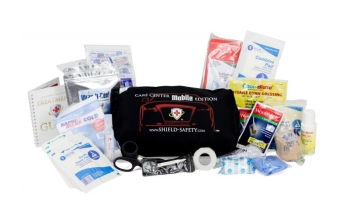Make Sure You Can Clean Wounds and Stop Bleeding
Every first aid kit should contain a bulb syringe. This allows you to clean deep cuts and make sure all dirt and bacteria are removed. Next, you will need to use antiseptic ointment or wipes to clean the area.
Finally, you’ll want to close the wound until you can get to a hospital. You can use butterfly sutures to close a smaller cut. Larger cuts will need bandage wraps, gauze pads, and strong waterproof adhesive tape, especially if you’ll be far from medical help, such as out in the wild on a hiking trip.
Focus on Infection Prevention
Every open wound puts you at risk of infection, and it can set in quickly. Make sure you have a plentiful supply of disinfectant solutions such as peroxide and alcohol wipes. If you have to change the wound’s dressing, you will need to clean it again and apply plenty of antibiotic solution.Add Pain Relief Supplies
Typically, pre-assembled kits come with a few tablets of Tylenol or ibuprofen, but you should have more on hand. Get some ice packs too. Icing a twisted ankle or knee will help with pain management and will keep swelling down while you wait for treatment. Also, you can add pain relief products that specifically help reduce discomfort in the event of a dental injury.Prepare for an Allergic Reaction
Even if you’ve never had an allergic reaction, you should prepare for one. Most people don’t find out about their allergies until after their first reaction.
Whether you react to a bug bite, food, or a chemical, an anaphylactic reaction could be deadly. Add antihistamines like Benadryl to your kit. It’s also worth it to add an EpiPen to your kit, especially if you have known serious allergies.
Personalize Your Kit
Think about who the kit is designed to help. For the most part, it will serve your needs and the needs of your family members. Design the contents around these needs.
Pre-assembled kits are a great starting point, but add an extra supply of your family’s regular prescriptions or over-the-counter medications. It wouldn’t hurt to include signed medical consent forms for everyone in your family either, along with brief medical histories and physician contact information.
Trust Shield-Safety for additional guidance on compiling and maintaining a first aid kit — contact the team today to find out more and to sign up for emergency response training opportunities.
